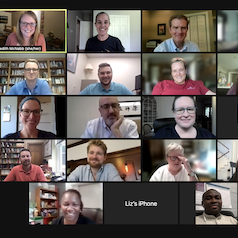Me vs We: Cultivating Generosity within Marginalized Communities
Me vs We: Cultivating Generosity within Marginalized Communities
by Dr. Carlos W. Perkins
“Each of you should give what you have decided in your heart to give, not reluctantly or under compulsion, for God loves a cheerful giver.” – II Corinthians 9:7
The conversation about generosity and stewardship within many Black and Brown faith communities sits alongside the recognition of institutionalized and systemic economic challenges. While we recognize and celebrate the gift of being a blessing to others, many are challenged by wealth inequalities and the lack of access to resources.
A report published by the Denver Foundation (2023) notes, “there is no greater indicator of racial inequity than the gap in wealth between Black and white Americans. From 2010 to 2020, Black full-time workers between the ages of 25 and 34 made an average of $39,820, compared to $52,750 for white workers. Additionally, the total assets of Black households averaged $206,966 compared to white households, whose total average was $1,101,412.”
In addition to these inequities, there are many believers who become uncomfortable with sermons that address generosity, especially financial giving. Consequently, some faith leaders stay away from the topic to keep the saints comfortable. The question that we must wrestle with is: how do we cultivate generosity within communities that have historically had a tenuous relationship with money?
What further complicates the conversation is that faith and generosity are intricately linked within many marginalized communities and are embedded in their legacy – a demonstration of faith is being generous toward community transformation. As such, to fully understand generosity in context, especially within the Black community, one must interrogate the collectivist practices of the community – practices that find generosity baked within a culture that encourages one to care for others like family, whether biological or communal. As a senior pastor of an historic anchor congregation, the generosity of the congregation has fueled its history of community engagement and transformational ministries. Historically, many marginalized faith communities have been the most generous in formal and informal ways.
Name the challenge in context
A traditionalist view on generosity that emphasizes individualism, the “me”, misses the essence of the “we.” Historically, to be generous was defined as giving beyond one’s means, often rooted in the giver’s personal convictions to support self-interest. Both the individualist and communalist approaches to generosity are built on a learned or conditioned response; however, they differ in motivation. Within marginalized communities, giving is often motivated by personal experience and aimed to bring relief to others rather than motivated by the donors’ self-interest. There is, however, a rising tension that centers on a type of Black middle class-ness that is aspirational in its attempt to mimic white philanthropic practices. Further evidence of this tension exists in the capricious acceptance of the preaching and teaching of prosperity gospel which speaks to the one’s ability to gain wealth through individual actions. On the contrary, giving must take a central place in our lives if we intend to live to our full potential as Christians. We can talk about prayer, bible study, or other spiritual habits, but none of these practices are more important than practicing generosity toward God and others.
Secondly, within some marginalized communities, there exists a history of financial, ethical, or even spiritual malpractice/abuse by religious leaders of congregational resources. Consequently, some younger givers and members have left the organized church to seek other opportunities to practice generosity. For many, the growth of the prosperity gospel rooted in individualism is contradictory to the fabric of what Martin Luther King, Jr so often refer to as the “beloved community.”
Cultivating the “we”
Cultivating generosity within marginalized communities requires us to tap into the historical rootedness of the Black Church’s collective “we.” Who we are as individuals directly correlates to who we are as a people. The “beloved community” still sits as the centerpiece of our liberation. How we fundraise tells the story of how we get freed.
This was evident to me while serving as the senior pastor of St. Luke AME Church – St. Croix. The congregation’s legacy over the past 102 years parallels the history of the Virgin Islands becoming a territory of the United States. Just as the people resisted colonization as a territory, the founding members of St. Luke chose spiritual liberation from the oppressors. They understood that “united we stand and divided we fall.”
This was further demonstrated in 2016 when the congregation found itself in a place where the physical structure of the church needed repair, but the church did not have a healthy relationship with a local financial institution. For 97 years, the congregation relied on the collective “we” to support its ministries. Consequently, they became an anchor institution within the local community providing services, support, and transformational ministries. However, the physical structure was in disrepair – they needed a new roof, and a complete renovation of the inside of the sanctuary.
Without hesitation, the congregation tapped into his history of generosity and collectivism. Within 12 months, the congregation doubled its annual budget, completed the renovation, and raised enough funds for a down payment on a new property for ministry development. The congregation understood that if they were to continue the legacy of community engagement, cultivating generosity required them to lean into our history of uplifting and promoting the mobility of the community. Furthermore, it required a resistance to the narratives of the traditional definition of philanthropy which is rooted in whiteness and individualism.
Much like the St. Luke AME Church – St. Croix congregation, marginalized communities look to faith institutions as a place of spiritual healing, fellowship, and a haven to build collective impact. How “we” fundraise tells the story of how we are freed!
Questions for Reflection
-
- How does your communities’ historical relationship with money impact generosity?
- “How we fundraise tells the story of how we get freed.” What does this mean to you and how can it help inform the work you do in fundraising?
Expanded Perspective
Our Faithful Generosity Story Shelf includes a story about this concept of Me vs. We that Carlos writes about in the above article. For example, amid calls for reparations, Arlington Community Church launched a foundation to lend interest-free funds to help Black Americans purchase their first home in their community. “I think it’s important for [predominately white] congregations that want to do this work to find Black folks to do the work with and to get their input and actually be in solidarity with the community,” said Rev. Celestine Fields, pastor of Arlington Community Church.
Read the full story and explore how this might spark imagination in your own congregation and community.
2024 ECRF Courses Now Open
 Our Executive Certificate in Religious Fundraising cohorts for 2024 are now open! This eight-week course for religious leaders seeking education on religious fundraising offers at-your-pace study through our learning management system, alongside weekly plenary and peer group zoom meetings. Each week you get to apply what you’re learning in your own context and have conversation partners to support you all along the way. We will soon add a few in-person options as well!
Our Executive Certificate in Religious Fundraising cohorts for 2024 are now open! This eight-week course for religious leaders seeking education on religious fundraising offers at-your-pace study through our learning management system, alongside weekly plenary and peer group zoom meetings. Each week you get to apply what you’re learning in your own context and have conversation partners to support you all along the way. We will soon add a few in-person options as well!
The Thomas H. Lake Scholarship
 The 2024 scholarship application is now open for the Executive Certificate in Religious Fundraising (ECRF). The ECRF is designed for religious leaders in faith-based organizations and institutions who wish to learn more about the spirituality of fundraising and gain a core foundation in fundraising principles. Scholarship criteria include both demonstrated financial need as well as the potential for applying course learnings in your current professional context, and will apply toward any 2024 ECRF open enrollment offering.
The 2024 scholarship application is now open for the Executive Certificate in Religious Fundraising (ECRF). The ECRF is designed for religious leaders in faith-based organizations and institutions who wish to learn more about the spirituality of fundraising and gain a core foundation in fundraising principles. Scholarship criteria include both demonstrated financial need as well as the potential for applying course learnings in your current professional context, and will apply toward any 2024 ECRF open enrollment offering.
Subscribe
Insights is a bi-weekly e-newsletter for the religious community and fundraisers of faith-based organizations that provides:
- Reflections on important developments in the field of faith and giving
- Recommended books, studies and articles
- Upcoming Lake Institute events


